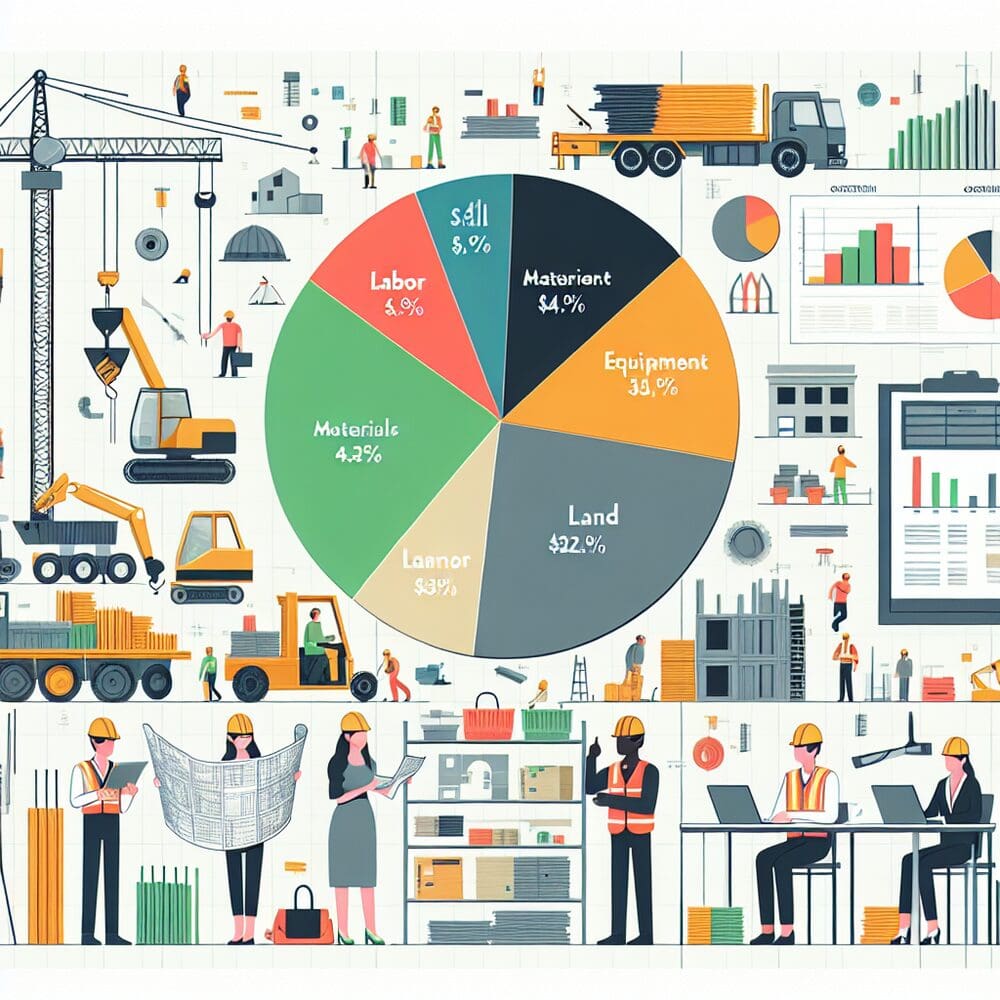Forecasting Project Costs: How Financial Software Helps Construction Managers Stay on Track
Image via DALL-E

Construction costs can quickly balloon to levels past the projected forecasts, which makes financial software more crucial than ever. Managing costs is challenging, with many moving parts like labor, materials, and unexpected delays. Without a proper system, tracking expenses can quickly become overwhelming. Financial software significantly reduces the risks and troubles associated with project cost management.
Still, it’s one thing to know about financial software and another to implement it within your organization. Forecasting a project’s costs takes much more effort than installing a new program on employee PCs. A foundational knowledge of construction cost management must exist to maximize the benefits of financial software in a construction project/
What is Financial Software?
Financial software is a digital tool that helps companies manage their financial operations. It offers a range of functions, such as accounting, budgeting, forecasting, and reporting. This software becomes even more essential due to the complexity of managing multiple projects, resources, and timelines in construction.
It’s important to understand that financial software is a complex tool that requires proper training and ample knowledge. Here’s how you can integrate financial software into your business:
Assess Your Needs
Evaluate your project’s financial requirements before even considering financial software. Identify the specific areas you want the software to manage. Whether that’s expenses, payroll, or budgeting, knowing where your needs lie goes a long way in deciding what kind of financial software you need.
Choose the Right Software
Select financial software built for the construction industry. Look for features that support critical tasks like job costing, budget tracking, and forecasting. Specialized software geared toward construction projects certainly exists in the industry. Ensure the software matches your company size and the complexity of your projects.
Train Your Team
Once the software is selected, train your team, especially those directly handling finances. Equip key personnel such as project managers and accountants with the knowledge necessary to use the software effectively. You’ll need to maintain regular assessments of their performance even past the onboarding process.
Integrate With Other Systems
If you use other project management or accounting systems, integrate them with the new financial software. Consult your IT team for the best ways to accomplish this task with minimal impact on daily productivity. Doing so ensures that all your tools work together and minimizes mistakes in the construction process.
Monitor and Adjust
Regularly review the financial data the software provides. Use its tracking and forecasting tools to monitor project costs and detect potential issues early. Remember, financial software is not immune from human error or random glitches. Adjust your budgets or plans as needed to keep your project on track.
Review and Optimize
At the end of the project, assess how well the software performed. Look for areas to use it for in future projects, and refine your processes to make the most of its features. After reviewing, see if there are better options for financial software or if the provider has more feature-rich plans that could help.
Benefits of Financial Software
You will see benefits bloom once you’ve integrated financial software into the construction project’s workflow. Take note of these benefits and study which ones can be capitalized on with innovations:
Improves Budget Accuracy
Financial software creates more accurate budgets by accounting for every aspect of the project. It tracks labor, materials, and equipment costs, helping you avoid overruns and keeping the project within its financial limits.
Provides Real-Time Tracking
You can monitor project expenses in real-time with financial software. This immediate access allows you to spot issues early and make quick adjustments. You stay on top of the budget by tracking costs as they happen and prevent overspending.
Simplifies Reporting
Financial software generates detailed reports automatically. This makes it easier for you to provide stakeholders with the latest financial information. By saving time on reporting, you ensure that reports are timely and accurate without extra effort.
Enhances Cost Forecasting
Financial software forecasts future costs more accurately using past project data. It helps you plan for risks and make necessary adjustments before problems arise, reducing the chance of unexpected expenses.
Increases Efficiency
Financial software automates tasks like invoicing and payroll, reducing manual input and human error. This frees up time for you and your team to focus on other critical project areas, increasing overall efficiency.
Centralizes Financial Data
Financial software keeps all project financial data in one place, making it easy to access and manage. With centralized data, you avoid confusion and ensure everyone on the project team is working with the same up-to-date information.
Conclusion
Predicting how much Money and resources a project will cost will always be simple, but financial software goes a long way toward untangling that knot. Once correctly integrated, financial software will help construction projects run smoother, faster, and more cost-efficient.
About the author of this article:
EDRIAN BLASQUINO
Edrian is a college instructor turned wordsmith with a passion for teaching and writing. With years of experience in higher Education, he brings a unique perspective to his writing, crafting engaging and informative content on various topics. He’s excited to explore his creative side and pursue content writing as a hobby.
LinkedIn I Facebook I Portfolio
Subscribe to our newsletter and Explore insightful conversations on workplace culture, Burnout, and leadership at the Breakfast Leadership Network, ranked Top 20 globally. Join us to thrive in the modern work environment.
Please stay connected with us! For more insights and valuable content, don’t forget to check out the following resources:
– **Breakfast Leadership Show Podcast**: Tune in to our podcast and get inspired by leadership lessons and success stories from top industry leaders.
– **Breakfast Leadership YouTube Channel**: Subscribe to our YouTube channel for video content on leadership, Personal Development, and more.
– **Hire Michael D. Levitt to Speak**: Looking for a dynamic speaker for your next event? Hire Michael D. Levitt, the founder of Breakfast Leadership, to share his expertise and insights.
Follow us on LinkedIn for the latest updates. Remember to share this article with your network!
Originally Published on https://www.breakfastleadership.com/
























